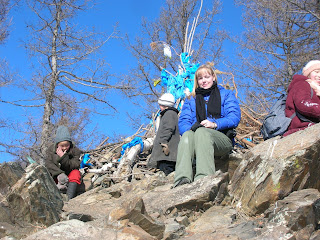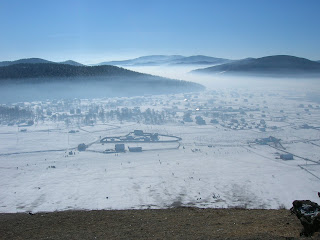Over the weekend, Jessica and I went to the town of Terelj in Gorki-Terelj National Park. The park is convenient, as it is only about 80 km from Ulaanbaatar. We hiked (got sore), rode horses (got sore), stayed in a ger, visited a family in there Ger while they received guests for the Tsagaan Sar holiday, and rode a crowded bus back to the city (I mean mosh pit-crowded). But rather than bore you with the tedious details, I want to take you on a journey through tedious pictures…
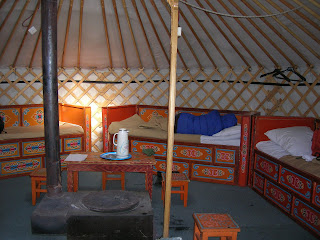
When we arrived in Terelj, we looked for a ger camp. Although the season is rather cold, we decided we would like to stay in the traditional Mongolian accommodations. Ours, short of really roughing it, sat behind a hotel. In the picture above, Jessica is taking a nap on the surprisingly comfortable ger beds. They sit up a bit high so as to keep you layer of heat that sits toward the top of the ger. We put our perishable goods on the floor near the wall and some of them froze…

Here is where the smoke exits the ger and the light enters. It is also the center of the radial network of poles that hold up the angled roof, covered with felt and canvass.

And here is why it is so important that the smoke exits the ger. Your options for warmth are wood, obviously salvaged from old furniture (thus the paint and the hinge) and lumps of coal. We found that the wood creates a hot, yet short-lived fire, while the coal provided a cooler, yet much longer sustained heat, good for the nights.

Here, Jessica is enjoying the comforts of the modern world while standing in a palpable coal-induced fog. The door can really kill your head if you don’t bend low enough, ask Jessica – she knows from first-hand experience.

When we awoke the next day, we decided to go for a hike. We walked through the small town and up some hills/mountains (I guess it depends on how you define it). From above, we could see groups of traditional local homes.
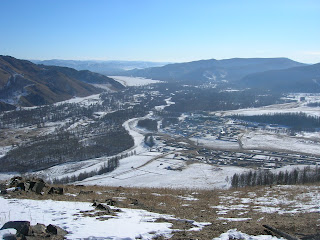
The mountains and hills around the town were not only beautiful, but incredibly quite and devoid human presence. You easily lose sight of any sign of civilization, and when you stand still, you can only hear your own tiny movements. When I tried to go to sleep the first night, my ears seemed to be ringing with the sound of nothingness.

We sometimes came upon animals grazing. No one was around. I suppose people just go collect their animals later. We happened upon this horse grazing just outside of town.

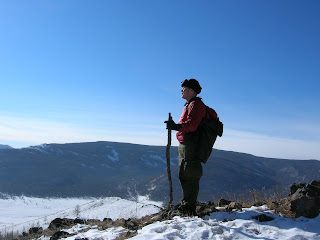
The views from the hilltops were wonderful, as evidenced above. Unfortunately, our forms didn’t always accentuate the pictures we took. Above, you can see two of our best pictures. I made Jessica include the picture of her with her eyes closed, as the scenery behind her is spectacular. This is not the busy tourist season, so we didn’t see another human for about five hours of walking.
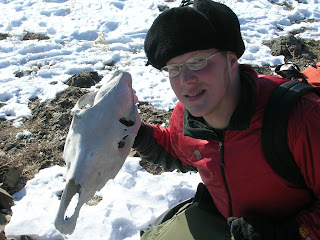
We saw an unnerving amount of bones and bone fragments on our hike. Here is one of my favorites. See how happy I am?
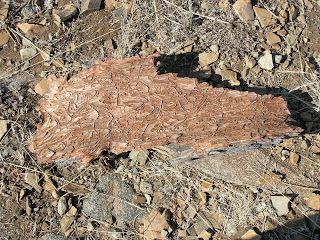
Jessica, on the other hand, was obsessed with the bark fragments we saw. The trees from which the bark fell must have been filled with termites or something, because the bark fragments had very interesting patterns carved into them.

from hill to hill (these are really big hills. maybe mountains), the landscape changed, sometimes subtly, sometimes drastically, as evidenced by Jessica’s perch above.
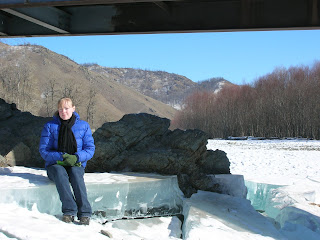
Something like five rivers run through Terelj, but they all freeze and/or dry up in the winter. This river appears to have done both. The river froze, then dried up underneath the ice, which eventually caved in. Our friend told us that the water in Terelj is clean enough to drink. We were skeptical until we looked at the ice. You could pick up a chunk and see right through it.
The next day, we took a horseback ride with a guide. Unfortunately, not being great riders, we weren’t able to take any pictures. In Terelj, horses are still the main means of local transportation. As we rode down a dry riverbed and out of town, people on horseback kept popping up everywhere. They were visible in the distance, then would disappear into the trees at a full gallop. Small children, old men, young people dressed in western fashions, everyone rides horses. And on this day, a holiday, everyone was very social, riding up beside our guide and shaking hands, talking for a minute, or helping us to get our lethargic horses moving, then they would ride off.
Our guide took us to visit a family in their ger. As it was a holiday, there were about 16 people inside. The ger had a diameter of maybe 16’. We were offered snuff (from a traditional snuff bottle – apparently kinda a big deal here) and tea, then vodka, candy, and buuz – the traditional steamed mutton dumpling that everyone eats on this holiday. In all, we were received warmly, and everyone appeared jovial and deferent to the elder of the household. We gave gifts to the oldest man there, and we were given gifts as well (I got socks, while Jessica got some sort of beauty product). Although I am sure that the family often receives foreigners during the tourist season, it was nice to visit on this holiday and see the family interact, including their many traditional habits (sitting around the ger according to age, accepting things from the elder with the right hand supported by the left hand, a greeting where arm position denotes elder relationships, etc). There was also a whole sheep skinned and cooked and then piled up in the middle of the small table. On top of the sheep carcass lay the tongue, apparently the most tasty part.

Finally, it was time to go. We waited by the side of the road, at the “bus stop.” Jessica is at the “bus stop” above. We were doubtful a bus would appear at 4pm as was promised. When the bus came from who knows where, it was already packed. We pushed in and proceeded to be packed tighter and tighter at each subsequent stop. We would occasionally stop on the side of the road in what seemed like the middle of nowhere to us (no buildings or gers to be seen) and there would be some more people wanting to pack onto the bus with us. We made it back to the city in just about 2 hours. The trip was over, but the ease with which we undertook it has inspired us to try and make more frequent weekend trips to the countryside. Why not? The long distance bus only costs about $1.50!
























